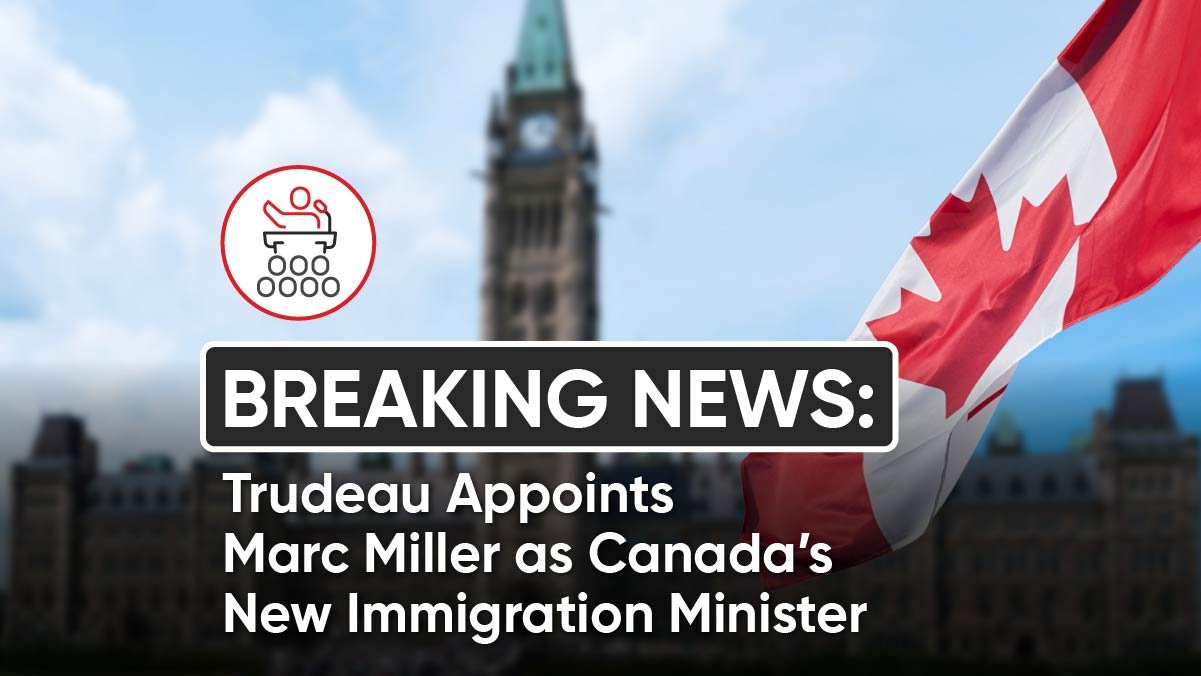26 July 2023 | Canada’s cabinet reshuffle by Prime Minister Justin Trudeau brought significant changes, with Marc Miller taking over as Canada's new Minister of Immigration, Refugees, and Citizenship, replacing Sean Fraser.
Introducing Marc Miller as Canada’s New Immigration Minister
In a big cabinet reshuffle announced by Canadian Prime Minister Justin Trudeau, Marc Miller was appointed Canada's new Minister of Immigration, Refugees, and Citizenship. The decision was made public on 26 July 2023 as Trudeau sought to reorganize his government's priorities and refresh its policies.
Formerly serving as the Minister of Crown-Indigenous Relations, Marc Miller stepped up to oversee immigration matters in the country. His appointment follows the tenure of Sean Fraser, who has been in charge of the immigration portfolio since October 2021. Fraser will now assume the position of Minister of Housing, Infrastructure, and Communities.
Marc Miller, a Quebec Liberal MP, brings a wealth of experience to his new role. Before venturing into politics, he pursued a legal career after graduating from McGill University's Faculty of Law. Additionally, Miller was an infantry commander in the Canadian Army Primary Reserve, showcasing his commitment to public service and leadership.
As the Minister of Crown-Indigenous Relations, Miller was instrumental in advancing discussions with Indigenous communities and working towards reconciliation. As the Immigration Minister, he is expected to bring the same dedication and determination to address immigration-related issues and opportunities in Canada.
The cabinet shuffle, a regular practice in Canadian politics, allows the Prime Minister to reevaluate the ministers' performance and promote those deemed effective in their roles. The government aims to refocus its efforts and address key national challenges by making strategic changes.
Former Minister Sean Fraser’s Legacy
Former Minister of Immigration Sean Fraser began his office in October 2021 after taking over from Marco Medicino. Despite facing challenges associated with the COVID-19 pandemic, Fraser propelled immigration forward.
During his tenure at Immigration, Refugees, and Citizenship Canada (IRCC), Nova Scotia MP Fraser confronted the daunting task of navigating the immigration system amidst the COVID-19 pandemic and its aftermath. With borders closed and processing capacities reduced, he devised a solution by granting temporary residents the opportunity to become permanent residents, allowing thousands of people to stay in Canada.
One of his major accomplishments was tackling the massive backlog of more than 2.5 million applications due to the pandemic-induced reduction in processing capacity. Despite this considerable challenge, Fraser's IRCC leadership will likely be remembered as a success.
Fraser's tenure was also marked by introducing occupation-specific draws to the Express Entry system. This new approach, implemented at the end of June, targeted specific professions, effectively attracting skilled individuals with in-demand expertise and boosting Canada's workforce.
In response to Canada's labor shortage and aging population, Fraser presented his 2023-2025 Immigration Levels Plan to welcome even more newcomers to the country. His vision aligned with the Liberal government's goal of addressing demographic challenges and promoting economic growth.
Beyond domestic immigration concerns, Fraser also played a pivotal role in Canada's response to Russia's invasion of Ukraine. He implemented special measures that enabled tens of thousands of individuals to seek refuge in Canada, escaping the conflict and finding a new home.
Throughout his two-year term as Immigration Minister, Fraser diligently prioritized the points outlined by Prime Minister Trudeau. These priorities encompassed increasing immigration levels, streamlining application processing, fostering francophone immigration, and more. Fraser made notable strides in these areas, bringing meaningful changes to Canada's immigration policies.
Watch Marc Miller’s swearing-in below:
The Future of Immigration in Canada
Canada is setting its sights on a bold target under the Immigration Levels Plan for 2023-2025 – welcoming 500,000 permanent residents annually by 2025. This pursuit comes in response to the country's two pressing challenges: an aging population and a low birth rate.
The Canadian government views immigration as a strategic measure to strengthen the nation's economy and fiscal standing. With historically low unemployment and high job vacancy rates, the country aims to tap into the potential of skilled individuals worldwide. Canada seeks to fill critical labor gaps and foster economic prosperity by attracting half a million newcomers annually.
In light of the recent major cabinet shuffle, the role of the Immigration Minister takes on even greater significance. As ministers are reassigned to key portfolios, including immigration, the Prime Minister may issue new mandate letters outlining specific priorities and responsibilities for each minister.
For the newly appointed Immigration Minister, this mandate is expected to include driving the successful implementation of the Immigration Levels Plan, ensuring the efficient selection and integration of newcomers and overseeing a responsive immigration system. It is a pivotal role that directly impacts Canada's ability to attract and retain skilled talent, entrepreneurs, and students, fueling its economic vitality.
To stay updated on more of our weekly news and the latest developments in immigration and citizenship matters, be sure to follow us on social media and subscribe to our Youtube channel.




